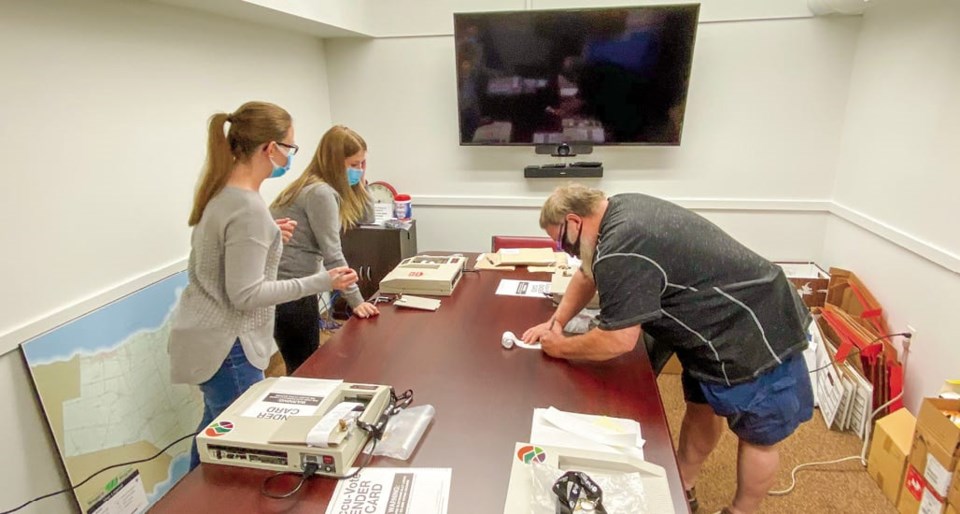The manner in which Pelham residents will cast their ballots in future municipal elections could change before the next time voters will head to the polls in 2026.
The Town is currently seeking feedback from residents on their preferred methods of voting – whether it be in person, including voting by proxy, by mail and online.
Council last month received a report on possible options for voting in the next municipal election that was put together by Clerk Holly Wilford and Deputy Clerk Sarah Leach. The report detailed pros and cons of each method – online, in person and by mail – and the estimated cost of each. These costs range from $35,390 for online voting to $125,875 for residents to cast ballots in person. Voting by mail falls near the middle at $84,932.
Additionally, the Town’s voting tabulators, which have been in use since 2001, have “surpassed their intended lifespan” according to the report. It would cost the Town just over $149,000 to replace the 15 machines it has on hand. Leasing new machines would be just over $25,000 and would allow the Town to keep up with technology. If voting were to go online, the tabulators would not be required.
Leach, who is serving as Acting Clerk while Wilford is on leave, said it’s normal for municipalities to review voting methods between elections. What is different this time, however, is the engagement with the public.
“We figured if our community has an appetite for these voting methods, let's go out to them and see if this were something that they would like us to look into,” Leach said. “But generally speaking, we do a quick review of these voting methods every election, there just tends to be one that stands out as the clear choice.”
But Niagara has become a bit of a hodgepodge in recent years when it comes to how municipal elections are run. Some have switched to online voting (Lincoln) while Grimsby uses a mix of online and in-person voting.
Leach said there are always concerns surrounding security for online voting.
“There are municipalities in Ontario that swear by it, and there are some that say we love it as an alternative or as just during advanced polls, but not during election day. So, there's no clear consensus across Ontario.”
But there are pros and cons to all methods the Town is considering, she said.
“The preference comes down to the community itself.”
Mayor Marvin Junkin agreed and said it will be interesting to learn where the public sits on the issue of how votes will be cast in 2026 and beyond.
“It will be quite interesting to see to see if our residents are happy with the status quo, or if they want to change things up,” he said. “One change that I see has happened in some other local municipalities is that their advance election polls are online, with only election-day voting taking place in person. That is just one combination of many that could be chosen.”
Leach, meanwhile, said that a combination of in person and online could be an alternative, even though it is not listed as an option for the consultation process.
“We didn't include those proposed combinations in the report, just because right now we're looking to see of the three, what would the community consider?”
Brock University political science professor emeritus David Siegel said that what the Town is doing “seems like a good initiative” to find out what voters would like.
“There is a view that voters should have multiple channels available to them,” he said. “For example, I'm very comfortable with online voting, but other people might not have a computer connection or feel comfortable with computers.”
While turnout for municipal elections has typically been low, Siegel isn’t sure what the impact will be if Pelham – or any municipality for that matter – decides to move away from the traditional method of voting in person, adding that he was not aware of any definitive study that links method of voting to changes in turnout.
“There are so many factors that affect voter turnout that it is difficult to isolate the impact of voting method,” he said. “A municipality could switch voting methods and see a change in turnout, but how much of that is caused by the change and how much by level of competition, weather, and so forth?
He added that it was good that the Town was considering plans for the 2026 election now.
“It is good to approach this issue at this time because the municipality has plenty of time to deal with whatever change it decides to make,” he said.
Information on the various methods of voting can be found online at engagingpelham.ca. There are also information boards on display at Town Hall and the Meridian Community Centre. The Town survey will be available until Dec. 1.
“I will be looking at the data and hopefully have a recommendation by Q1 or Q2 of next year for council,” Leach said, meaning Town politicians should have a report before them by the end of June.
“I know council is very interested in the public's input, the public's preference.”
The next municipal election is scheduled for just over a year from now, on Oct. 26, 2026.



